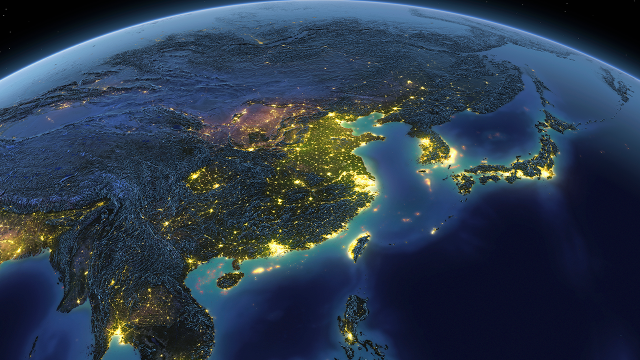
In parts of East Asia, roughly half of adults or more view China’s power and influence as a major threat, according to a Pew Research Center survey conducted between June and September 2023.
This analysis explores perceptions of global threats – something Pew Research Center has a long history of measuring. In this case, the focus is on how adults in four places in East Asia view the threat posed by the United States, China and Russia and the nuclear capabilities of North Korea.
The data for this analysis is from Hong Kong, Japan, South Korea and Taiwan. It comes from a survey of 10,390 adults conducted in five Asian publics from June 2 to Sept. 17, 2023. (Data for Vietnam, the fifth place surveyed, is not available for these questions.) All surveys included in this analysis were conducted over the phone.
This analysis is based on surveys conducted in Asia conducted as part of the Pew-Templeton Global Religious Futures project, which analyzes religious change and its impact on societies around the world.
Here are the questions used for the analysis, along with responses, and the survey methodology.
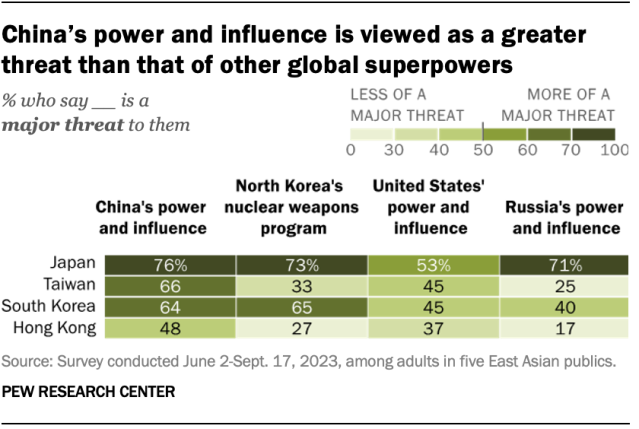
In most places surveyed, more people name China’s influence as a major threat than any of the other geopolitical issues asked about. Those issues include North Korea’s nuclear weapons program and the power and influence of the United States and Russia.
In South Korea and Japan, though, North Korea’s nuclear weapons program is also a top concern. Most Japanese adults also see Russia’s power and influence as a major threat – though fewer than half of adults in the other places surveyed agree.
China’s power and influence
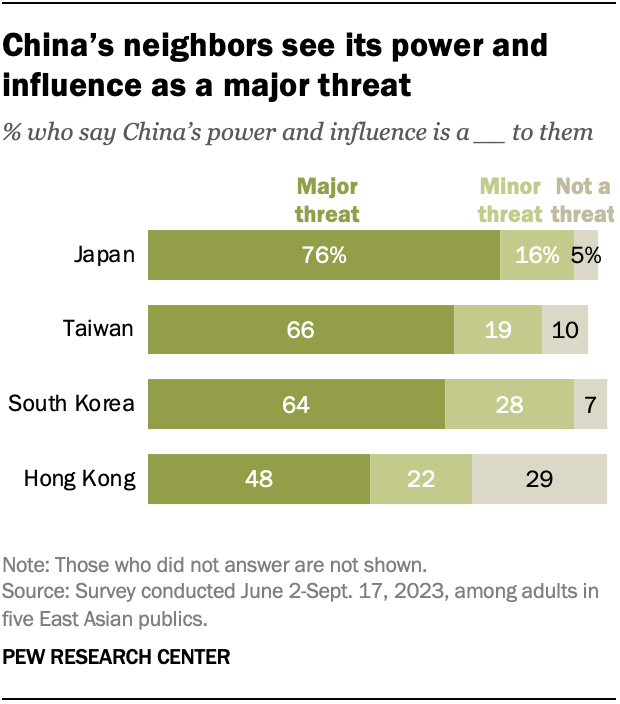
Majorities of adults in Japan, Taiwan and South Korea see China’s power and influence as a major threat to them. Roughly half of adults in Hong Kong (48%) agree. And large majorities in all places surveyed call China at least a minor threat.
In Japan, 76% of adults consider China a major threat. This is comparable to the share (74%) who said the same in 2013, amid flare-ups in the East China Sea, and higher than the share (69%) who said this toward the end of the last decade.
In comparison, 64% of South Koreans consider China a major threat, but they are less likely now than they were in 2013 (76%) to say this. (Comparable trend data is not available in Hong Kong or Taiwan.)
Related: China’s Approach to Foreign Policy Gets Largely Negative Reviews in 24-Country Survey
Views of China as a threat differ by educational attainment, age and party affiliation:
- Those with more education are consistently more likely than those with less education to view China’s power and influence as a major threat. In Japan, for example, 81% of those with more education say China is a major threat, compared with 72% of those with less education.
- In Hong Kong and Taiwan, adults under age 35 are more likely than older adults to consider China’s power and influence a major threat.
- In Taiwan, supporters of the governing Democratic Progressive Party (DPP) are more likely than supporters of the oppositional Kuomintang (KMT) to view China’s power and influence as a major threat to Taiwan (78% vs. 59%). Supporters of other parties and those who are unaffiliated with any party (65%) are also less likely than DPP supporters to label China as a major threat.
North Korea’s nuclear weapons program
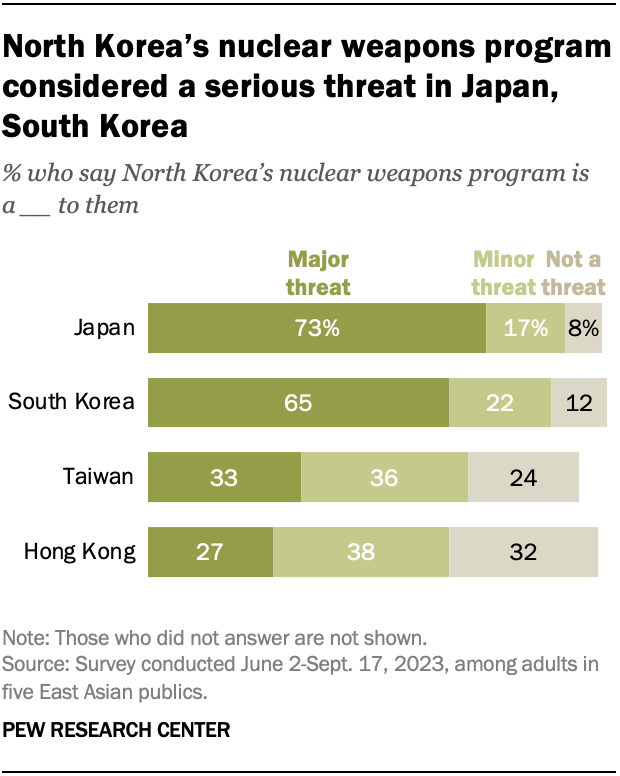
Majorities in Japan and South Korea say North Korea’s nuclear weapons program is a major threat to their country. Significantly smaller shares in Taiwan and Hong Kong say the same. Still, most people in all four places call North Korea’s nuclear capabilities at least a minor threat.
For Japan and South Korea, these shares are largely unchanged since 2018, when the question was last asked amid then-President Donald Trump’s summit with North Korean leader Kim Jong Un. But the shares are slightly lower than they were in 2013, when the question was first asked.
In some places surveyed, opinions vary across some demographic groups:
- In South Korea, three-quarters of those who support the People Power Party (PPP) say North Korea’s weapons capabilities are a major threat to their country. That compares with 60% who say the same among those who support the governing party (DPK).
- In Taiwan and Japan, women are more likely than men to call North Korea’s nuclear weapons program a major threat.
U.S. power and influence
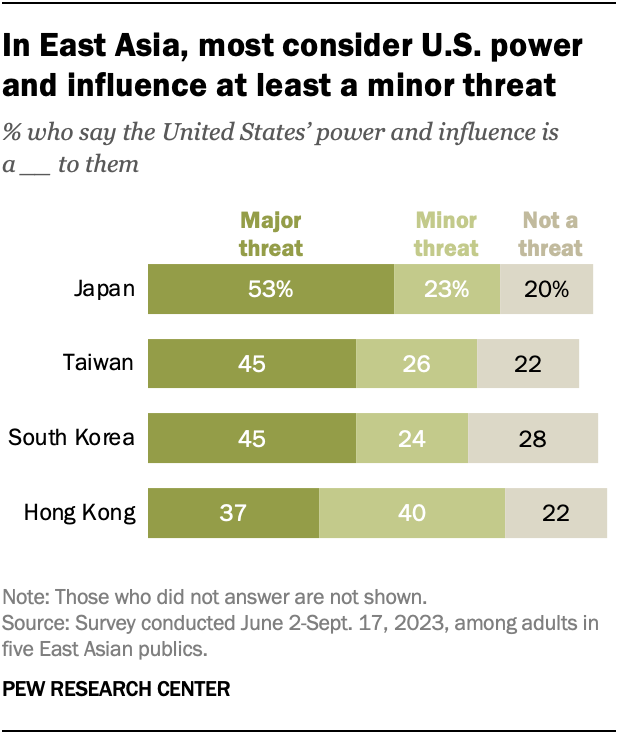
Most East Asian adults surveyed see the United States’ power and influence as a threat to them. That includes 53% of Japanese adults who say the U.S. poses a major threat to their country.
In both Taiwan and South Korea, 45% say the U.S. poses a major threat and roughly a quarter call it a minor threat.
Adults in Hong Kong are the least likely to call the U.S. a major threat (37%) but the most likely to call it a minor threat.
In South Korea and Japan, the shares calling the United States’ power and influence a major threat have fallen by 22 and 13 percentage points, respectively, since 2018. This aligns with a significant jump in confidence that the U.S. president will do the right thing regarding world affairs between Trump’s time in office and Joe Biden’s presidency.
Related: International Views of Biden and U.S. Largely Positive
In certain places, gender, education and party are all related to these opinions:
- Japanese, South Korean and Taiwanese women are more likely than men to see U.S. power and influence as a major threat. In South Korea, for example, 52% of women hold this view compared with 39% of men.
- In those three places, adults with more education are more likely than those with less education to call U.S. influence a major threat. For example, 51% of Taiwanese adults with more education say this, compared with 40% of those with less education.
- In South Korea, supporters of the governing DPK are more likely than supporters of PPP to call U.S. power and influence a major threat (54% vs. 32%).
- In Taiwan, KMT supporters are far more likely than DPP supporters to say the U.S. poses a major threat (63% vs. 34%).
Russia’s power and influence
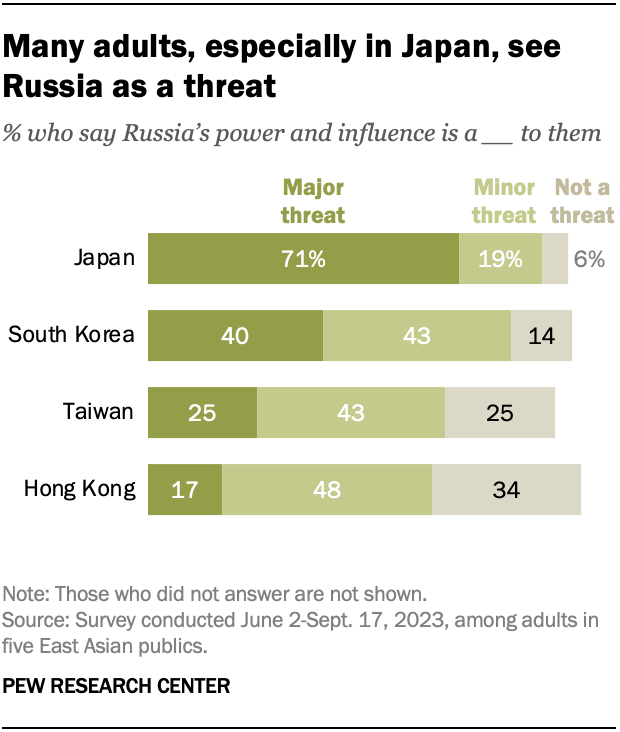
Many adults view Russia’s power and influence as a threat, but to a lesser degree than the power and influence of China or the U.S. Japanese adults are the most concerned by Russia’s influence, with about seven-in-ten (71%) labeling it as a major threat.
In comparison, no more than four-in-ten in South Korea, Taiwan and Hong Kong view Russia as a major threat. People in those three places are much more likely than Japanese to label Russia a minor threat instead. At least a quarter of adults in Taiwan and Hong Kong dismiss Russia’s power and influence as a threat entirely.
In Japan, the share labeling Russia’s power and influence as a major threat has grown substantially since 2017, rising 28 percentage points.
Related: Large Shares See Russia and Putin in Negative Light, While Views of Zelenskyy More Mixed
Across the four places, views of Russia’s power and influence do not differ greatly by political affiliation, but they do vary somewhat by educational attainment and gender:
- In Hong Kong, those with more education are more likely than those with less education to see Russia’s power as a minor threat (55% vs. 45%). The same is true in Taiwan (51% vs. 38%).
- In Hong Kong and Japan, men are 7 points more likely than women to consider Russia’s power and influence a minor threat.
CORRECTION (Jan. 8, 2024): Due to an editorial error, a previous version of this post misstated the name of Taiwan’s Democratic Progressive Party (DPP).
Note: Here are the questions used for the analysis, along with responses, and the survey methodology.





